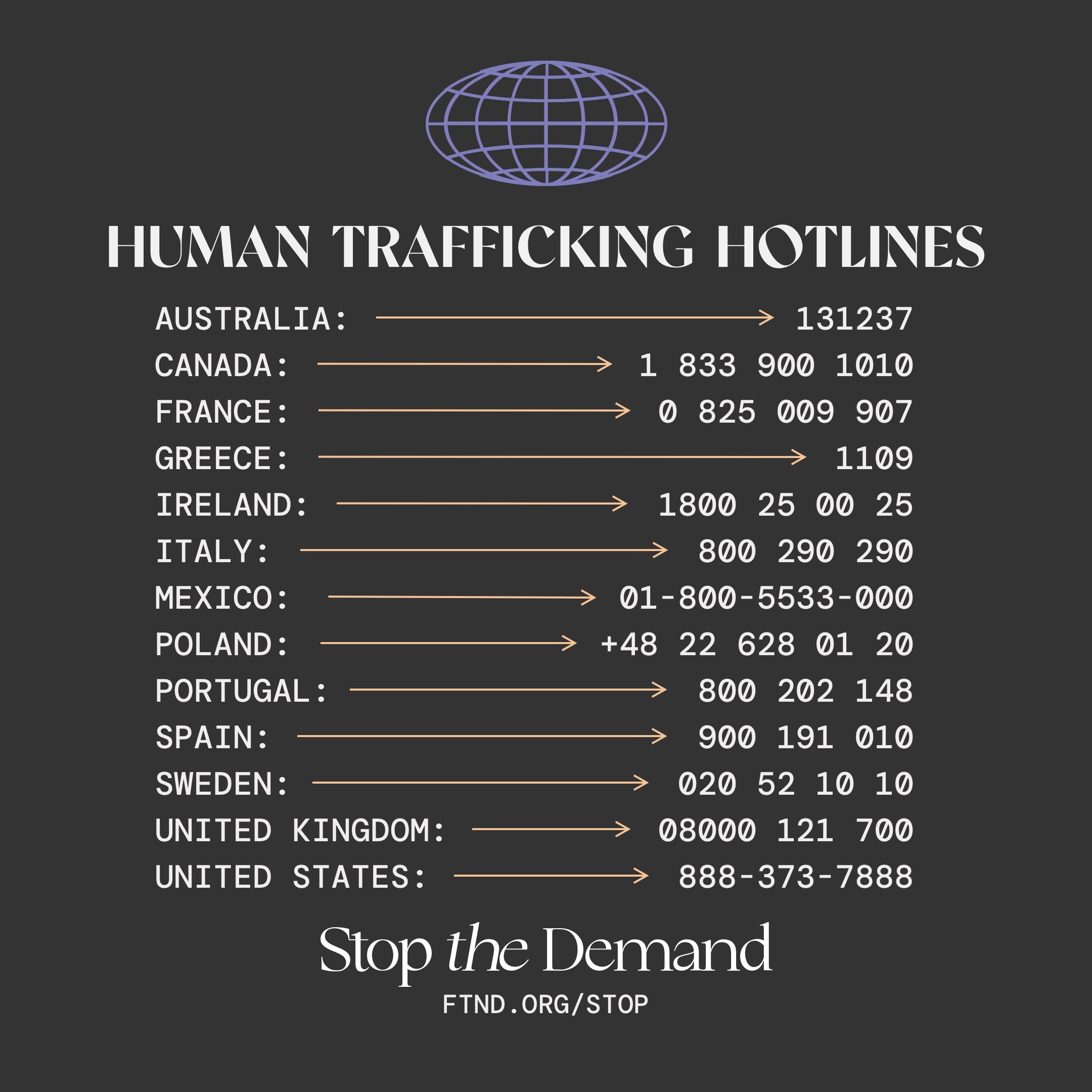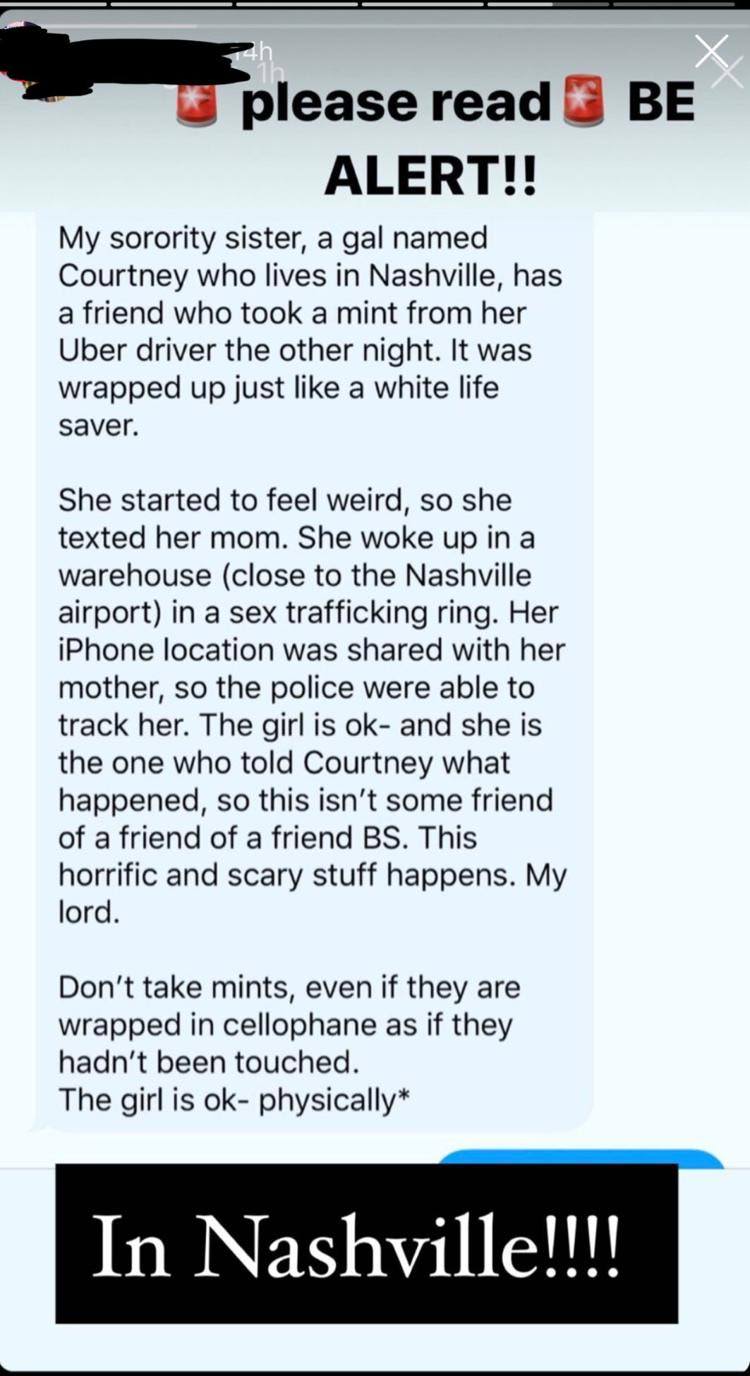Don’t believe everything you read on the internet. We know you probably don’t already, but it bears repeating.
Advocates of human trafficking victims are becoming increasingly concerned that while some information floating around on the web may have hints of truth, a lot of social posts and conspiracy theories misrepresent what many trafficking victims actually go through.
Here’s a real example.
In this social post, a claim was made that a Nashville woman was drugged by a stranger—her Uber driver—then taken to a warehouse to be trafficked. While the post suggests authorities later found and recovered the woman, local police say they have no record of the incident. This isn’t to say that this definitively didn’t happen, though it seems there is no reliable record of it happening.
Now don’t get us wrong—trafficking like this can and does happen, and of course, a possible drugging and kidnapping situation is very serious.
While we can’t definitively say the incident did or didn’t occur, we do know that more often than not, trafficking looks more like a victim being taken advantage of by someone they know rather than kidnapped by a stranger like the movie “Taken.”
Related: How To Identify Sex Trafficking Victims And Stop Contributing To Sexual Exploitation
Margie Quin, CEO of End Slavery Tennessee, shared that while posts like these help raise awareness, they can also make matters more difficult for authorities, and she hopes readers will seek out more information. “They’re thinking the only way that could happen to me is if I was drugged and kidnapped…Typically you’ll see either familial trafficking which means you’re brought in very young. Anytime commercial sex involves force, fraud, or coercion, then that’s trafficking.”
Quin added, “I think [posts like this one] does a disservice to victims who are trafficked at young ages by family or are coerced, manipulated, or romanced unsuspectingly by a trafficker.”
Myth-busting sex trafficking scenarios
The first step in fact-checking trafficking-related stories and theories is to understand a clear definition of what sex trafficking is.
The Trafficking Victims Protection Act, or TVPA, defines sex trafficking as a situation in which “a commercial sex act is induced by force, fraud, or coercion, or in which the person induced to perform such act has not attained 18 years of age.”
So while it’s devastatingly true that some victims are drugged, thrown into the back of a car, and sold for sex—much like a scenario from the movie “Taken”—this is only a very narrow perception of what sex trafficking really looks like across the globe.
Related: The Traffickers, Victims, And Buyers: Here’s How Sex Trafficking Happens
More often than not, victims are groomed and coerced into performing commercial sex acts at the hand of someone they know, trust, or even love. Too often, porn performers are forced or manipulated into sex acts beyond what was agreed upon in their contract and threatened to not be paid or be left jobless. And any situation where a minor is involved in commercial sex acts is classified as a trafficking situation.
See the difference?
And while all of these situations are traumatic and unacceptable, they do look different than the action sequences of “Taken.” Promoting only Hollywood versions of what a sex trafficking victim goes through can do a great disservice to real victims whose reality may look much different but whose stories still matter. It is possible to have been sex trafficked and also receive a paycheck and sleep in your own bed.
No version of human trafficking deserves to be diminished because it isn’t “that bad.” All versions of trafficking need immediate attention and awareness, whether kidnapping has occurred or not.
Get the facts from reputable anti-trafficking organizations
Fight the New Drug is, first and foremost, an awareness-raising organization that educates on the harmful effects of porn using science, facts, and personal accounts. We focus on sex trafficking in so much of our content because the sex trafficking and porn industries are heavily interlinked, but we rely on giving visibility to information directly from other reputable organizations and coalitions to inform our content about trafficking and exploitation.
Related: 9 Popular Conspiracy Theories About Sex Trafficking, Debunked
The encouraging news is, just like we do, there are many survivor-led organizations and reputable organizations out there that you can use as the baseline for information about trafficking.
Here are a few examples of sources to get you started the next time you need to fact-check a trafficking-related theory or story you see online. Note that this list is incomplete and linking these organizations does not constitute an endorsement by Fight the New Drug. While some of these organizations might have legislative or religious involvement, Fight the New Drug is non-religious and non-legislative.
- Polaris Project. This is an excellent resource for discerning human trafficking rumors. The organization offers a well of information related to understanding human trafficking, myths, facts, and statistics, and more. You can also browse the organization’s trafficking-related data and research and proposed long term solutions for change. This organization operates the National Human Trafficking Hotline and has gathered a lot of data from hundreds of thousands of calls they receive, too.
- The National Center on Sexual Exploitation. Consider NCOSE your go-to for exposing the connection between all forms of sexual exploitation. From projects like engaging the public, exposing some of the biggest contributors and profiters of sexual exploitation, and fighting sexual exploitation on an international level to resources for survivors, porn consumers, spouses and more, you’re sure to find a way to get help or get involved on this platform.
- The U.S. Institute Against Human Trafficking. This organization’s focus is on finding new and innovative ways to end the demand for sex trafficking, raise awareness on the pandemic of human trafficking in the United States, and provide safe environments for victims to heal—including a safe home for boys. With the goal of educating American citizens and leaders on the facts of human trafficking, the platform is a great resource to get educated or get help.
- Thorn. Thorn is a tech company with the goal of building tools to help defend children from sexual abuse. The organization also offers extensive information on the issue of child sexual exploitation, including child sexual abuse material and the role technology plays in the exploitation, advertisement, and abuse of children.
- The National Center for Missing and Exploited Children. The goal of the NCMEC is to fight the abduction, abuse, and exploitation of children. The organization offers a place to report a missing child, report a child being exploited online, education on the issues of child exploitation, victim and family support, and more.
- Sun Gate Foundation. A survivor-led organization, the focus of the Sun Gate Foundation is on human trafficking survivor aftercare. The organization aims to help survivors create meaningful educational opportunities and live fulfilling lives from the unique perspective of human trafficking survivors themselves.
- The National Human Trafficking Hotline. This is a go-to for reporting tips or suspected human trafficking cases in the United States. It’s operated by the Polaris Project, who we mentioned above. You can also browse the site for trafficking-related statistics, advocate and victim resources, and tips for debunking myths or recognizing signs of human trafficking in your community.
If you hear about a specific story from a specific area, it might be worth checking local media reports and local police station’s social media to see if there are corroborating reports of the incident in question happening or clarifying information, like the Nashville story above.
Related: What This Anti-Trafficking Expert Says Is The Key To Ending Sex Trafficking
Ultimately, where you get information from matters. And in the fight against human trafficking, real progress can be made when each of us gets the facts and checks reliable organizations before sharing information.
So the next time you come across a trafficking-related story or post, try cross-checking it with one of the organizations like what we discussed above. See if any of these or other anti-trafficking organizations have posted about something on their social media. And once you’ve learned the facts, spread the word.
Your voice matters in the fight to end human trafficking. A world free from sexual exploitation is a goal we can all work toward—together.
Should you want to report or seek services related to a case of human trafficking, you can contact the National Human Trafficking Hotline at 1-888-373-7888 or email [email protected].





